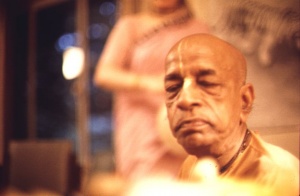SB 10.73.1-6
(Redirected from SB 10.73.6)

A.C. Bhaktivedanta Swami Prabhupada
Please note: The synonyms, translation and purport of this verse were composed by disciples of Śrīla Prabhupāda
TEXTS 1-6
- śrī-śuka uvāca
- ayute dve śatāny aṣṭau
- niruddhā yudhi nirjitāḥ
- te nirgatā giridroṇyāṁ
- malinā mala-vāsasaḥ
- kṣut-kṣāmāḥ śuṣka-vadanāḥ
- saṁrodha-parikarśitāḥ
- dadṛśus te ghana-śyāmaṁ
- pīta-kauśeya-vāsasam
- śrīvatsāṅkaṁ catur-bāhuṁ
- padma-garbhāruṇekṣaṇam
- cāru-prasanna-vadanaṁ
- sphuran-makara-kuṇḍalam
- padma-hastaṁ gadā-śaṅkha
- rathāṅgair upalakṣitam
- kirīṭa-hāra-kaṭaka-
- kaṭi-sūtrāṅgadāñcitam
- bhrājad-vara-maṇi-grīvaṁ
- nivītaṁ vana-mālayā
- pibanta iva cakṣurbhyāṁ
- lihanta iva jihvayā
- jighranta iva nāsābhyāṁ
- rambhanta iva bāhubhiḥ
- praṇemur hata-pāpmāno
- mūrdhabhiḥ pādayor hareḥ
SYNONYMS
śrī-śukaḥ uvāca — Śukadeva Gosvāmī said; ayute — ten thousands; dve — two; śatāni — hundreds; aṣṭau — eight; niruddhāḥ — imprisoned; yudhi — in battle; nirjitāḥ — defeated; te — they; nirgatāḥ — coming out; giridroṇyām — in the fortress of Giridroṇī, Jarāsandha's capital; malināḥ — dirty; mala — dirty; vāsasaḥ — whose clothes; kṣut — by hunger; kṣāmāḥ — emaciated; śuṣka — dried up; vadanāḥ — faces; saṁrodha — by their bondage; parikarśitāḥ — greatly weakened; dadṛśuḥ — saw; te — they; ghana — like a cloud; śyāmam — dark blue; pīta — yellow; kauśeya — of silk; vāsasam — whose clothing; śrīvatsa — by the distinctive sign known as Śrīvatsa; aṅkam — marked; catuḥ — four; bāhum — having arms; padma — of a lotus; garbha — like the whorl; aruṇa — pink; īkṣaṇam — eyes; cāru — charming; prasanna — and pleasant; vadanam — face; sphurat — gleaming; makara — shaped like sea monsters; kuṇḍalam — with earrings; padma — a lotus; hastam — in His hand; gadā — by His club; śaṅkha — conchshell; ratha-aṅgaiḥ — and disc weapon; upalakṣitam — identified; kirīṭa — with a helmet; hāra — jeweled necklace; kaṭaka — gold bracelets; kaṭi-sūtra — belt; aṅgada — and armlets; añcitam — decorated; bhrājat — brilliant; vara — excellent; maṇi — a jewel (the Kaustubha); grīvam — on His neck; nivītam — hanging (from His neck); vana — of forest flowers; mālayā — with a garland; pibantaḥ — drinking; iva — as if; cakṣurbhyām — with their eyes; lihantaḥ — licking; iva — as if; jihvayā — with their tongues; jighrantaḥ — smelling; iva — as if; nāsābhyām — with their nostrils; rambhantaḥ — embracing; iva — as if; bāhubhiḥ — with their arms; praṇemuḥ — they bowed down; hata — destroyed; pāpmānaḥ — whose sins; mūrdhabhiḥ — with their heads; pādayoḥ — at the feet; hareḥ — of Lord Kṛṣṇa.
Translation and purport composed by disciples of Śrīla Prabhupāda
TRANSLATION
Śukadeva Gosvāmī said: Jarāsandha had defeated 20,800 kings in combat and thrown them into prison. As these kings emerged from the Giridroṇī fortress, they appeared dirty and shabbily dressed. They were emaciated by hunger, their faces were dried up, and they were greatly weakened by their long imprisonment.
The kings then beheld the Lord before them. His complexion was dark blue like the color of a cloud, and He wore a yellow silk garment. He was distinguished by the Śrīvatsa mark on His chest, His four mighty arms, the pinkish hue of His eyes, which resembled the whorl of a lotus, His lovely, cheerful face, His gleaming makara earrings and the lotus, club, conchshell and disc in His hands. A helmet, a jeweled necklace, a golden belt, and golden bracelets and armlets decorated His form, and on His neck He wore both the brilliant, precious Kaustubha gem and a garland of forest flowers. The kings seemed to drink His beauty with their eyes, lick Him with their tongues, relish His fragrance with their nostrils and embrace Him with their arms. Their past sins now eradicated, the kings all bowed down to Lord Hari, placing their heads at His feet.